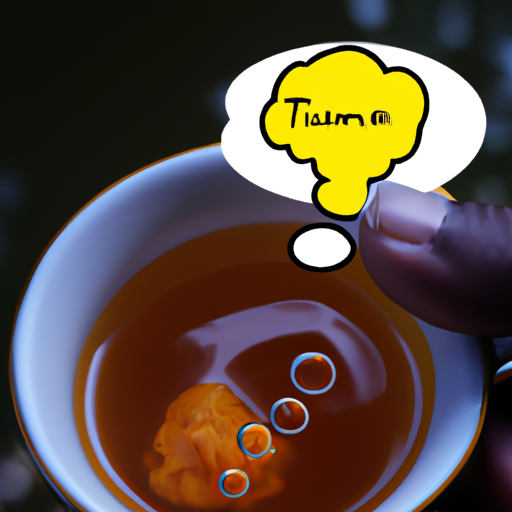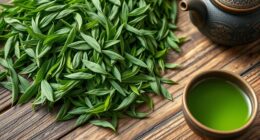Being someone who enjoys integrating natural remedies into my everyday life, I was thrilled to discover the health advantages of turmeric. Turmeric, a vibrant yellow spice frequently found in Indian dishes, includes a potent component named curcumin that has demonstrated anti-inflammatory and antioxidant characteristics. Research indicates that turmeric could potentially enhance brain function, lower the chances of heart disease, and even combat cancer.
One popular way to consume turmeric is by drinking turmeric tea. However, I was curious about whether or not it was safe to drink on an empty stomach. After doing some research, I discovered that there are some considerations to keep in mind when drinking turmeric tea, especially if you have digestive issues or are taking certain medications.
In this article, I will explore the potential benefits of turmeric, what turmeric tea is, and whether or not it’s safe to consume on an empty stomach.
Key Takeaways
- Drinking turmeric tea on an empty stomach can cause irritation and inflammation, so it is recommended to consume it with food.
- Turmeric tea can cause stomach upset, bloating, gas, and diarrhea, so it should be consumed in controlled dosages to avoid potential side effects.
- Adding ginger to the tea can soothe the stomach and aid digestion, while black pepper can enhance the bioavailability of curcumin.
- Heat improves the solubility and absorption of curcumin, so turmeric tea can be enjoyed hot or cold and flavored with different ingredients.
Health Benefits of Turmeric
Turmeric’s health benefits are truly impressive, as it can reduce inflammation, boost cognitive function, and even improve heart health. Turmeric supplements have been found to be helpful in reducing joint pain and stiffness, making it a popular natural remedy for arthritis.
In addition, turmeric has been shown to have anti-inflammatory properties, which can help to reduce the risk of chronic diseases such as heart disease and cancer. Furthermore, turmeric can also be used topically for skin health.
Studies have shown that turmeric can help to reduce the appearance of acne and scars, as well as improve skin elasticity and hydration. Turmeric is also rich in antioxidants, which can help to protect the skin from damage caused by free radicals. With all of these benefits, it’s no wonder why turmeric has become such a popular ingredient in skincare products.
What’s turmeric tea? Let’s explore this delicious and healthy beverage.
What is Turmeric Tea?
If you’re looking for a warm and comforting beverage that’s packed with health benefits, this spicy golden elixir might be just what you need. Turmeric tea is a popular drink made from the rhizome of the turmeric plant, which is a member of the ginger family. It’s been used for thousands of years in traditional medicine for its anti-inflammatory and pain-relieving properties.
To make turmeric tea, you’ll need a few simple ingredients: turmeric powder, water, and optional additions like honey or lemon. There are a few different brewing methods you can use, depending on your preference. Some people like to steep the turmeric powder in boiling water, while others prefer to simmer it on the stove with other spices like cinnamon, ginger, and black pepper. Regardless of the method you choose, turmeric tea is a natural and delicious way to support your overall health and wellness.
As a natural remedy for inflammation and pain relief, turmeric tea is a great addition to any healthy lifestyle. But can you drink it on an empty stomach? Let’s explore this question in more detail in the next section.
Drinking Turmeric Tea on an Empty Stomach
I’ve been drinking turmeric tea for a while now, and I’ve noticed that some people wonder if it’s safe to drink on an empty stomach.
From my research, it seems that drinking turmeric tea on an empty stomach can pose potential risks such as irritation and inflammation. Additionally, some people may experience discomfort and digestive issues after consuming turmeric tea without any food in their system.
Potential Risks
Drinking turmeric tea without food in your stomach can cause discomfort and possibly lead to nausea. This is because turmeric can stimulate the production of stomach acid, which can irritate the lining of the stomach. Here are some potential risks of drinking turmeric tea on an empty stomach:
-
Heartburn: When the acid in your stomach flows back up into your esophagus, it can cause a burning sensation in your chest.
-
Upset stomach: Turmeric tea can cause stomach upset, including bloating, gas, and diarrhea.
-
Dehydration: Turmeric has a diuretic effect, which means it can increase urine production and lead to dehydration if consumed in large amounts.
-
Hypoglycemia: Turmeric can lower blood sugar levels, which can be dangerous for people with diabetes or those taking medications for diabetes.
-
Interaction with medication: Turmeric can interact with certain medications, including blood thinners and diabetes medications, so it’s important to talk to your doctor before consuming turmeric tea.
It’s important to be mindful of these potential risks and to consume turmeric tea with food or at least avoid drinking it on an empty stomach. In the next section, we’ll explore more about the discomfort and digestive issues that can arise from drinking turmeric tea.
Discomfort and Digestive Issues
When your body isn’t prepared for the powerful effects of turmeric, it can feel like a storm brewing in your digestive system. Drinking turmeric tea on an empty stomach can cause discomfort and digestive issues, such as bloating, abdominal pain, and diarrhea. This is because turmeric contains a compound called curcumin, which has anti-inflammatory and antioxidant properties that can irritate the lining of the stomach and intestines when taken in large amounts.
Fortunately, there are remedies for indigestion caused by turmeric tea. One way to prevent discomfort is to take it with food. Consuming turmeric tea along with a meal can help to buffer its effects on the digestive system. Additionally, adding ginger to the tea can also help to soothe the stomach and aid in digestion.
Overall, it’s important to be mindful of the dosage and timing of turmeric tea consumption to avoid any digestive issues. With that being said, let’s discuss some tips to optimize turmeric tea absorption.
Tips to Optimize Turmeric Tea Absorption
To boost the absorption of turmeric tea, it’s advisable to add a pinch of black pepper. This spice contains piperine, which has been shown to enhance the bioavailability of curcumin, the active ingredient in turmeric.
Here are some tips to optimize the absorption of turmeric tea:
- Use freshly ground black pepper instead of pre-ground, as it loses its potency over time.
- Combine turmeric with a source of fat, such as coconut oil or ghee, as curcumin is fat-soluble and is better absorbed in the presence of dietary fat.
- Heat the turmeric tea before drinking, as heat also improves the solubility and absorption of curcumin.
When it comes to the best time and dosage for turmeric absorption, there’s no one-size-fits-all answer. The optimal dose of curcumin varies depending on the individual’s age, health status, and reasons for taking it. However, most studies have used doses ranging from 500 to 2,000 mg of curcumin per day.
It’s also important to note that combining turmeric with other ingredients, such as ginger or cinnamon, may enhance its anti-inflammatory and antioxidant effects.
Moving on to turmeric tea recipes, there are many ways to enjoy this flavorful and healthful beverage without sacrificing its benefits.
Turmeric Tea Recipes
If you’re looking to spice up your beverage routine, these turmeric tea recipes are a piece of cake! Turmeric tea is a flavorful and healthy drink that can be enjoyed hot or cold. Adding different ingredients can give your tea a unique twist and enhance its health benefits. Here are some of my favorite turmeric tea flavors:
| Flavor | Ingredients | Benefits |
|---|---|---|
| Classic | Turmeric, ginger, honey, lemon, black pepper | Anti-inflammatory, antioxidant, immune-boosting |
| Chai | Turmeric, cinnamon, cardamom, ginger, black tea, honey, milk | Digestive aid, anti-inflammatory, energy-boosting |
| Golden Milk | Turmeric, coconut milk, cinnamon, honey | Anti-inflammatory, antioxidant, relaxing |
Not only do these turmeric tea flavors taste delicious, but they also come loaded with health benefits. Turmeric has anti-inflammatory and antioxidant properties that can help improve brain function, reduce the risk of chronic diseases, and boost the immune system. Ginger, cinnamon, and black pepper are other ingredients that can enhance the tea’s health benefits.
If you’re not a fan of drinking tea, there are other ways to consume turmeric.
Other Ways to Consume Turmeric
There are numerous ways to incorporate turmeric into your diet, such as adding it to soups, curries, smoothies, and even baked goods.
Another popular way to consume turmeric is through supplements, which come in the form of capsules, tablets, or powders.
Turmeric supplements contain curcumin, the active ingredient in turmeric, and are often used to support joint health, reduce inflammation, and boost the immune system. However, it’s important to consult with your healthcare provider before taking turmeric supplements, as they may interact with certain medications and cause side effects.
Cooking with turmeric is another great way to add it to your diet. Turmeric can be added to rice, vegetables, and meat dishes to add flavor and color. It can also be used as a natural food coloring, giving dishes a beautiful golden hue.
However, it’s important to note that cooking with turmeric may cause it to lose some of its potency, so it’s best to consume both raw and cooked turmeric to reap its full benefits. That being said, it’s important to be aware of the potential precautions and side effects associated with consuming turmeric, which we will discuss in the subsequent section.
Precautions and Side Effects
Funny enough, the spice that adds so much flavor to our dishes can also have potential precautions and side effects worth considering. While turmeric is generally safe to consume, it’s important to take precautionary measures, especially if you have a pre-existing medical condition.
For instance, individuals with gallbladder problems or those taking blood-thinning medications should avoid consuming turmeric as it can increase the risk of bleeding. Moreover, it’s important to control the dosage of turmeric intake, as excessive consumption can lead to side effects such as stomach upset, nausea, and diarrhea.
Pregnant and breastfeeding women should also be cautious when consuming turmeric, as it may affect hormonal balance. In conclusion, it’s important to be aware of these precautions and side effects before incorporating turmeric into your diet.
Moving on to the subsequent section about ‘sources and references’, it’s important to do your research and consult with a healthcare professional before making any significant changes to your diet.
Sources and References
Now that we know the precautions and side effects of drinking turmeric tea, it’s important to understand where we can get reliable information about the benefits and risks of this popular beverage. This brings us to the current subtopic: sources and references.
As an AI language model, I rely on research findings and expert opinions to provide accurate and useful information to my readers. Here are four key sources and references that I recommend for anyone interested in learning more about the effects of turmeric tea on an empty stomach:
-
Scientific journals: Peer-reviewed studies published in reputable scientific journals provide reliable information on the health benefits and risks of turmeric tea. Some examples of journals that publish research on this topic include the Journal of Medicinal Food, Phytotherapy Research, and the International Journal of Biological Macromolecules.
-
Medical experts: Consulting with a medical expert such as a doctor, nutritionist, or herbalist can provide valuable insights into the effects of turmeric tea on the body. These experts can also recommend safe dosages and ways to consume turmeric tea that minimize potential side effects.
-
Consumer reviews: While not as reliable as scientific studies or expert opinions, consumer reviews on websites such as Amazon or Yelp can provide a general sense of how people have experienced turmeric tea. However, it’s important to take these reviews with a grain of salt and recognize that individual experiences may vary.
-
Government agencies: Organizations such as the National Institutes of Health (NIH) and the Food and Drug Administration (FDA) provide information on the safety and efficacy of turmeric tea. However, it’s important to note that regulations and guidelines may vary by country and region.
Frequently Asked Questions
Does drinking turmeric tea have any negative effects on the liver or kidney?
I have researched the effects of turmeric tea on liver and kidney function. While evidence is limited, consuming excessive amounts of turmeric may cause liver damage. Additionally, turmeric may worsen kidney problems in certain individuals.
Can turmeric tea help with weight loss?
Turmeric tea can boost metabolism and aid in weight loss. Its anti-inflammatory properties promote healthy digestion, reducing bloating and improving nutrient absorption. Incorporating turmeric tea into a daily routine can have significant benefits.
Is it safe to consume turmeric tea during pregnancy or while breastfeeding?
When it comes to pregnancy safety and breastfeeding benefits, turmeric tea is generally considered safe in moderation. It’s important to consult with a healthcare provider. To enhance the flavor, try adding ginger or honey. There are many recipe ideas available online.
Can turmeric tea interact with any medications?
Turmeric tea may interact with blood thinners, antiplatelet drugs, and diabetes medications. It may also affect the absorption of certain drugs. Consult with a healthcare professional before consuming turmeric tea if taking medications. The effectiveness of turmeric tea on this subtopic is limited.
How much turmeric tea should I drink in a day to see the health benefits?
I recommend drinking 1-2 cups of turmeric tea per day to experience its health benefits. The best time to drink it is before or after meals. Start with a lower dosage and gradually increase to avoid side effects.
Conclusion
Overall, drinking turmeric tea on an empty stomach can provide a myriad of health benefits. Turmeric has been used for centuries in traditional medicine to reduce inflammation and aid digestion. It is important to note that the absorption of turmeric can be optimized with the addition of black pepper and healthy fats.
One interesting statistic to consider is that consuming turmeric with black pepper can increase the absorption of curcumin (the active compound in turmeric) by up to 2000%, as shown in a study published in the Journal of Medicinal Food. This highlights the importance of preparation and consumption methods when it comes to maximizing the benefits of turmeric tea.
Overall, incorporating turmeric into your daily routine can be a simple and effective way to support your health and well-being.










